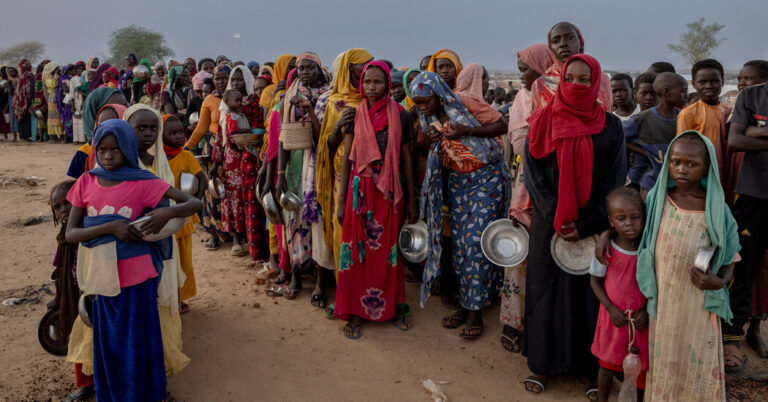The United States is initiating new peace talks on Wednesday that are aimed at stopping Sudan’s catastrophic civil war, with this push for dialogue driven by growing alarm that the conflict is sending the country deeper into a famine that experts warn could become the world’s worst in decades.
But Sudan’s military, one of the war’s two main belligerents, has said it will not attend the negotiations in Switzerland, stymying hopes of a quick cease-fire in a fight between the forces of rival generals that has now lasted 16 months.
Famine was officially declared earlier this month in Sudan’s western Darfur region, and other areas are expected to follow. By one estimate as many as 2.5 million Sudanese could die from hunger by the end of September.
Appalled at the scale of the war-induced catastrophe in Sudan, a sprawling country in northeastern Africa, American officials said it was urgent to begin the new peace drive, even if chances of a breakthrough seem slim.
Lt. Gen. Mohamed Hamdan, the paramilitary leader whose Rapid Support Forces are fighting the military, reiterated on Monday that his side would attend the talks. But after a drone strike appeared to target the army leadership at a parade in eastern Sudan on July 31, the military chief, Gen. Abdel Fattah al-Burhan, spurned the meeting.
“We will not retreat, we will not surrender and we will not negotiate,” General al-Burhan told troops.
The Switzerland meeting picks up from talks in Jeddah, Saudi Arabia, that failed to stop the fighting. Even before the talks in Geneva could start, however, American officials sought to temper expectations.
Tom Perriello, the U.S. envoy to Sudan, said in an interview that his goal is to broker a cease-fire and to strike a deal for full humanitarian access across Sudan, where more than 10 million people have been forced from their homes and tens of thousands are estimated to have died.
But if, as seems likely, one of the two forces fighting each other does not turn up, American officials hope to at least revive the moribund peace process and pressure both sides to come to the table. American diplomats also aim to generate a sense of global urgency about a ballooning humanitarian crisis whose relief efforts remain chronically underfunded, despite the severity of the problem.
“We need to start pivoting to a different set of solutions if we are to prevent a couple of million people from starving,” Mr. Perriello said.
As of Tuesday, the United Nations had received just one-third of the $2.7 billion it had requested for Sudan. People are dying because aid agencies lack funding, said Mohamed Refaat, country director with the U.N.’s International Organization for Migration.
“We see people who are dying, and who we have access to, who we can’t do anything for,” Mr. Refaat said in a video call with reporters from the de facto capital, Port Sudan, where all government functions have been moved with Khartoum divided between the two sides.
The previous talks in Saudi Arabia ran aground after the Sudanese military refused to attend unless the R.S.F. abandoned most of its military gains since the war started in April 2023 — effectively a refusal to attend.
American officials began to also see the Saudis as part of the problem, saying they seemed to be doing little to encourage the talks to resume, according to two officials who spoke on the condition of anonymity to discuss sensitive diplomacy.
Some Saudi officials seemed to relish growing tension between the United States and Saudi Arabia’s own rival, the United Arab Emirates, over the military support that the Emiratis have continued to supply to the R.S.F., the two officials said.
At the talks in Geneva, Saudi officials will no longer be leading mediation efforts, and will instead be listed as “co-hosts” with Switzerland.
Despite American assurances that the talks will focus narrowly on a cease-fire, many Sudanese civilian leaders worry they could ultimately pave the way for a power-sharing deal between the warring generals whose feud is destroying the country, instead of leading to the democratic transition many once hoped for.
The talks carry risk for the United States, too. The Biden administration has already faced criticism from Sudanese and even former American officials that flawed diplomacy in 2022 set the stage for the outbreak of war in 2023.
“Well-intentioned but counterproductive diplomatic efforts” by the United States and others “at best, failed to prevent the war and at worst contributed to its outbreak,” Payton Knopf, a former American diplomat who participated in some of those efforts, wrote this week.
Some Sudanese commentators have called the Geneva talks a “now or never” opportunity, noting that the chief organizer, Mr. Perriello, could be replaced, depending on the outcome of the presidential election in the United States.
Nick Cumming-Brucecontributed reporting from Geneva



